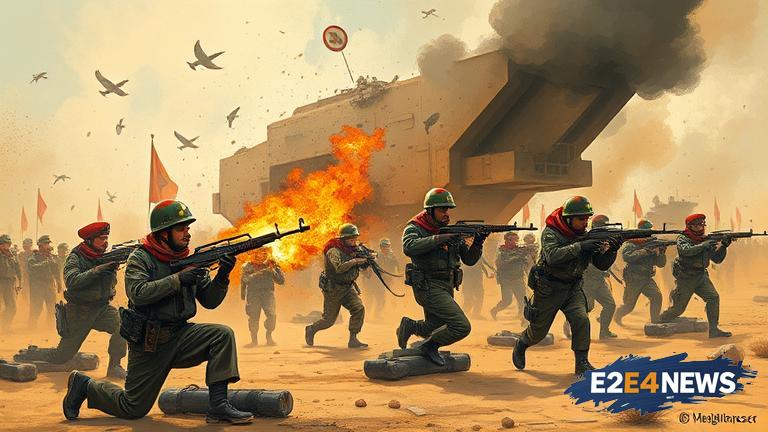Hezbollah, a Shia Islamist political and militant group based in Lebanon, has a complex and multifaceted history that spans several decades. Founded in 1982 during the Lebanese Civil War, the group’s initial objective was to resist Israeli occupation. Over the years, Hezbollah has evolved into a significant political and military force in the region, with considerable influence in Lebanese politics and a strong presence in the Middle East. The group’s rise to prominence was marked by its resistance against Israeli forces, which eventually led to Israel’s withdrawal from Lebanon in 2000. However, this victory was soon followed by a series of conflicts, including the 2006 Lebanon War, which resulted in significant damage to Lebanon’s infrastructure and a substantial loss of life. Despite these challenges, Hezbollah has continued to maintain its military capabilities, with a arsenal that includes rockets, missiles, and other advanced weaponry. The group’s military strength has been a subject of concern for neighboring countries, particularly Israel, which views Hezbollah as a significant threat to its national security. In recent years, there have been ongoing discussions about the possibility of disarmament, with some Lebanese officials calling for the group to surrender its weapons. However, these talks have been met with resistance from Hezbollah, which argues that its military capabilities are necessary for the country’s defense. The group’s stance on disarmament has been a point of contention, with some arguing that it is a prerequisite for Lebanon’s stability and others seeing it as an attempt to undermine the group’s influence. As the situation continues to unfold, it is clear that Hezbollah’s history, rise, and current stance on disarmament are intricately linked to the broader geopolitical landscape of the Middle East. The group’s relationships with other countries, including Iran and Syria, have played a significant role in shaping its trajectory. Furthermore, Hezbollah’s involvement in regional conflicts, such as the Syrian Civil War, has further complicated its position. Despite these complexities, there is a growing recognition of the need for a comprehensive solution that addresses the root causes of the conflict and promotes a lasting peace. This would require a multifaceted approach that takes into account the political, social, and economic factors that have contributed to the situation. In addition, there is a need for increased dialogue and cooperation between the various stakeholders involved, including the Lebanese government, Hezbollah, and the international community. Ultimately, the path forward will depend on the ability of these parties to work together towards a common goal of stability and peace. The current discussions about disarmament are a crucial step in this process, and it is essential that they are approached with caution and sensitivity. As the international community continues to monitor the situation, it is clear that a peaceful resolution will require a deep understanding of the complex historical, political, and social factors that have shaped Hezbollah’s rise and current stance. The group’s history is a testament to the enduring impact of conflict and the need for sustainable solutions that address the root causes of violence. In conclusion, Hezbollah’s complex history, marked by conflict, political influence, and regional impact, is a critical factor in understanding the current situation and the prospects for a lasting peace. The group’s rise, wars, and weapons have all contributed to its current position, and any attempts to address the situation must take these factors into account. As the situation continues to evolve, it is essential that all parties involved approach the discussions with a deep understanding of the complexities at play and a commitment to finding a peaceful and sustainable solution.
